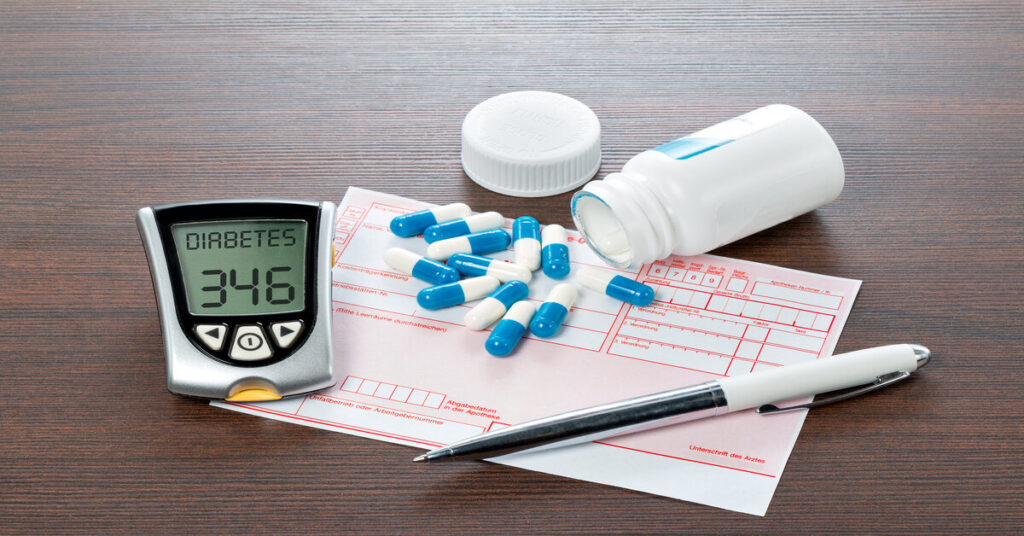
Buy Adderall Online – Fast & Secure Ordering
Buy Adderall Online Safely and Conveniently Are you searching for a trustworthy source to buy Adderall online? You’ve come to the right place. At CureCart,…
+1 (341) 208-3081
No products in the cart.

Commonly recommended for ADHD to help with attention and concentration is Adderall. But now, another factor its relationship to diabetes, has attracted increasing attention. Knowing how Adderall interacts with your body will help you if you have diabetes or worry about blood sugar levels. Knows the link between Adderall and blood sugar levels.
Table of Contents
ToggleAdderall including amphetamine salts is a stimulant that increases dopamine and Norepinephrine levels in the brain. This can affect blood sugar and metabolism in several different ways, even if it helps with attention and alertness:
If you control diabetes, you should be aware of these consequences and modify your daily schedule. Monitoring meals, blood sugar levels, and any changes in your mood will enable you to keep on maintaining your health.
For patients with diabetes, keeping stable blood sugar levels is very essential. The effects of Adderall can complicate this procedure by:
If you face diabetes and consume Adderall, managing both diseases can feel challenging at certain times. The goal is to collaborate closely with your healthcare experts to design a strategy customized particularly to your requirements. A personalized approach can help you stay on top of both your ADHD and diabetes without leaving one situation complicated the other. These useful techniques will enable you to limit Adderall usage and maintain blood sugar levels within normal range:

Adderall may cause abrupt fluctuations in blood sugar levels, hence you should keep closer than normal monitoring of them. Frequent testing will enable you to early identify any unexpected increases or declines. Whether you use a continuous glucose monitor (CGM) or a glucose monitor, monitoring your readings lets your doctor and you modify your treatment plan as necessary.
One of the most common negative effects of Adderall is appetite suppression means a decrease in appetite, it might make you feel like skipping meals. Moreover, For a person who is a diabetic patient, missing meals can cause dangerous irregular ups and downs in blood sugar levels. Try to take regular meals on time and include balanced meals with proteins, good fats, and carbohydrates to maintain your glucose levels balanced all over the day even if you’re not hungry.
Adderall and other stimulants raise your risk of dehydration. So, dehydration can affect the way your body controls blood sugar. Make a habit of drinking water regularly, even if you don’t feel thirsty. Bring a water bottle with you and, if necessary, set reminders; staying hydrated helps your body balance and supports general well-being.
Adderall can affect how your body reacts to diabetes substances, thus your dosage may need to be adjusted. Regular visits to your doctor will Monitor how your body responds to Adderall. Your doctor may need to change your diabetic medication dosage or adjust the schedule to ensure your blood sugar will stay within a safe range.
If you have any of the following symptoms while using Adderall and controlling diabetes, visit your healthcare professional immediately:
In addition to these physical symptoms, it’s necessary to be aware of emotional and psychological changes in your body. If your anxiety, restlessness, or mood fluctuations interfere with your everyday activities, these might indicate that Adderall is having harmful effects on you. Extended anxiety may cause changes in blood sugar levels and complicate diabetes control. Health professionals say symptoms like extreme anxiety, trouble concentrating, or sleeplessness refer to for a professional analysis. Your doctor can decide whether Adderall is causing these problems and can recommend changes in dose or substitutes. They could also advise therapy or other therapies to help control anxiety and preserve normal blood sugar levels.
Understanding the link between Adderall and diabetes is critical for persons treating both diseases. Although Adderall can help with ADHD symptoms, its possible impact on blood sugar levels should be known. Maintaining balance and guaranteeing secure use of noth medicines depend on regular monitoring and open conversation with healthcare doctors and lifestyle changes. If you have concerns about controlling your diabetes while using Adderall, see your doctor to build a treatment plan which suited to your health requirements.

Buy Adderall Online Safely and Conveniently Are you searching for a trustworthy source to buy Adderall online? You’ve come to the right place. At CureCart,…

Adderall is a well-known medication primarily prescribed for the treatment of Attention Deficit Hyperactivity Disorder (ADHD) and narcolepsy. It is known to improve focus, attention,…

When it comes to enhancing focus, boosting energy, and staying alert, two substances generally come to mind: Adderall and caffeine. Both are powerful stimulants that…

Adderall is a commonly prescribed medication for attention deficit hyperactivity disorder (ADHD) and narcolepsy. Adderall is Well-known for its capacity to improve concentration and energy,…

Adderall is a frequently used medicine, prescribed mostly to treat Attention Deficit Hyperactivity Disorder (ADHD) and narcolepsy. Although it helps control symptoms, concerns have been…

What is Abilify Withdrawal? The medicine prescribed for diseases including schizophrenia, bipolar illness, and severe depressive illness, Abilify (Aripiprazole) is an atypical antipsychotic medication For…
Awareness that health dependent upon habit that we control makes first generation